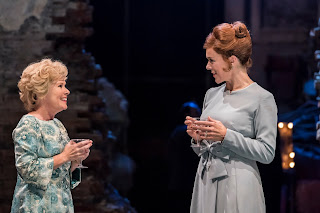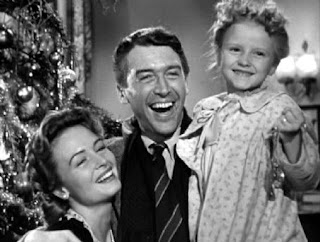 The "New Year" is my favorite holiday. Hands down. (Okay, okay, maybe tied with Thanksgiving. But it's super close.) When you think about it, it really shouldn't be a holiday at all. It's just a day. A man-made reckoning of the passing of time. Nobody's birthday is attached to it. No famous battle started or stopped on this day. No historical screw up that evolved into a party. Just another day, but yet - not. The fact that we all - all of us, all over the world - decide to celebrate the simple act of turning a page in a calendar is important (as well as fun).
The "New Year" is my favorite holiday. Hands down. (Okay, okay, maybe tied with Thanksgiving. But it's super close.) When you think about it, it really shouldn't be a holiday at all. It's just a day. A man-made reckoning of the passing of time. Nobody's birthday is attached to it. No famous battle started or stopped on this day. No historical screw up that evolved into a party. Just another day, but yet - not. The fact that we all - all of us, all over the world - decide to celebrate the simple act of turning a page in a calendar is important (as well as fun).New Year celebrations for me have always been contemplative. No, not in a gazing at my navel meditation way. In a clearing out the file drawers of my life way. More like what you do at tax time only with joy and mindfulness instead of angst and anxiety. Know what I mean? The end of a year is rather like taking all the memories from that year and visiting them one more time. Like so many snapshots, some beautiful, some not, we take one more glance at them before we box them away and put them on a shelf. We write the year on the box in big, bold Sharpie in case we need to reference it in the future. Put a little smiley face next to the year if it was a good one. A frowny face, perhaps, if it was laced with difficulty or sadness. This box then gets slid right next to the others in chronological order.
Then we open a new box. Empty. Clean. It has that new box smell. It waits for tender memories, exciting new adventures, new selfies, new challenges, new everything. This new empty box calls to us quickly, daring us to start filling it up. Boxes hate being empty.
Throughout the year, I've noticed many people post pictures on their social media sites of themselves in their "happy place." All of these pictures have one thing in common. There is, usually, only one person in the picture. Of course, someone probably took the picture so there would have been at least two people, but the happy place referred to is typically the happy place for the person in the picture. Alone. These happy place pictures are always very beautiful. Tropical beaches, peaceful harbors, snow-capped mountains, sun-kissed pine forests. Stunning pictures worthy of Arizona Highways or Popular Photography. Not "happy."
 I think what people mean by "happy place" is "quiet place." Those are two different things. When I think of a happy place, I think of , well, you know...happy! Joy, gladness, laughter, friendship, love, camaraderie, jokes, stories, food, wine. Personally, my happy places always involve other people. Drinks with a friend as we solve the problems of the world or settle an issue with our significant other can be a happy place. Dinner with loved ones where we catch up on stories and lie a lot and laugh more is definitely a happy place. Watching a play in a crowded theatre as we hold our collective breath. Concerts where everyone knows the words. Museums where people crowd around a masterpiece. Happy places, too. I had a happy place this year that took me by surprise. For the first time ever, my daughter and I were at the zoo (momentous event in itself). Hardly a quiet place, definitely a happy one. She and I were standing together - shoulder to shoulder. My arm around her waist. A throng of other zoo-goers hustling and bustling by. We stood in the middle of this polite chaos, watching as her husband and eldest daughter laughed at some animals with my wife. Two people watching three people as they leaned on a railing to see the flamingos. Happy place. Shutter click. Into the box.
I think what people mean by "happy place" is "quiet place." Those are two different things. When I think of a happy place, I think of , well, you know...happy! Joy, gladness, laughter, friendship, love, camaraderie, jokes, stories, food, wine. Personally, my happy places always involve other people. Drinks with a friend as we solve the problems of the world or settle an issue with our significant other can be a happy place. Dinner with loved ones where we catch up on stories and lie a lot and laugh more is definitely a happy place. Watching a play in a crowded theatre as we hold our collective breath. Concerts where everyone knows the words. Museums where people crowd around a masterpiece. Happy places, too. I had a happy place this year that took me by surprise. For the first time ever, my daughter and I were at the zoo (momentous event in itself). Hardly a quiet place, definitely a happy one. She and I were standing together - shoulder to shoulder. My arm around her waist. A throng of other zoo-goers hustling and bustling by. We stood in the middle of this polite chaos, watching as her husband and eldest daughter laughed at some animals with my wife. Two people watching three people as they leaned on a railing to see the flamingos. Happy place. Shutter click. Into the box.When we wish each other a Happy New Year, we are NOT hoping that we each have a long string of quiet days where dogs don't bark, babies don't cry, and the restaurants are silent with the sound of old people gumming their mashed potatoes. We are saying "have a great time this year!" Fill your new box with amazing things. Have a million happy places not just one. Have your quiet time, sure. We all need to decompress, slow down, take a breath, reboot. Just don't confuse quite for happy. There is nothing quiet about happy. Happy is laughter and love. Happy is friends and family. Happy is sometimes messy and marvelous.
The passing of one year to the next is the one time of year when the sole purpose of the holiday is to wish that the person next to you - wherever you are - has a happy year. That is worth celebrating. That is why it is my favorite.
HAPPY New Year, Friends. Happy New Year.







